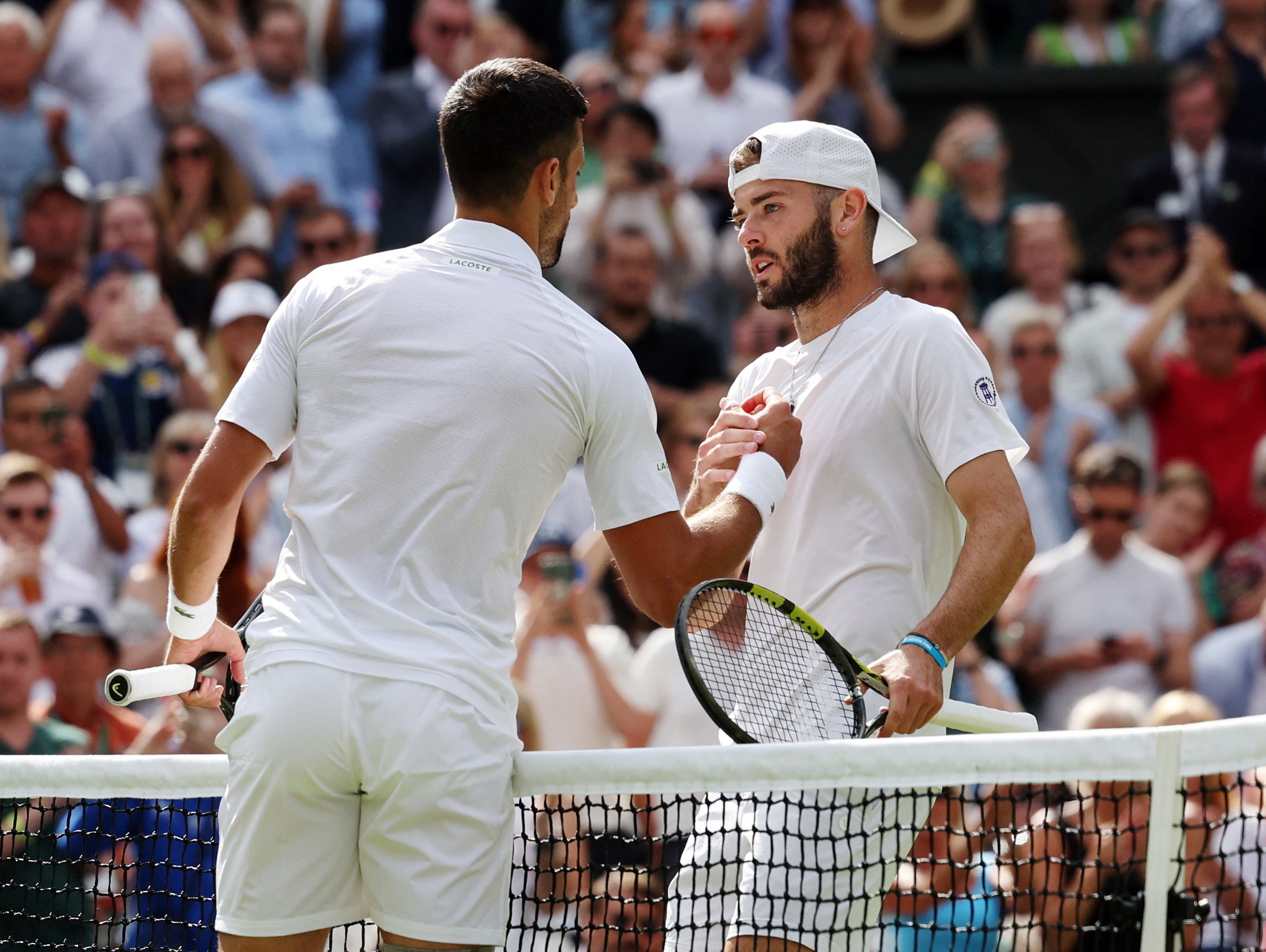The question of how do you beat Novak Djokovic was one Jacob Fearnley admitted he did not have the answer to, one he would not lose any sleep over trying to figure out. Because how could you, really, prepare for a match against the greatest of all time, an opponent without flaws, apart from the compression strapping around his right knee. Why worry about the occasion of walking out onto Centre Court against the seven-time Wimbledon champion, when you’ve only played won challengers and college matches in the United States, experiences that are incomparable to this.
Perhaps the only way was to try and take everything in your stride and play with nothing to lose, which Fearnely, the British wildcard and world No 277, did brilliantly here. Undeterred by the big moments going against him in the first two sets, unflustered after then going a break down in the third, Fearnley renewed his attacks against Djokovic and with each forehand winner and roar from the Centre Court crowd, the 24-time grand slam champion looked a little more mortal. Suddenly, as Fearnley broke to win the third and his opponent stumbled on that right knee, Djokovic looked beatable.
Then, as Fearnley bludgeoned his forehand and Djokovic creaked on a double fault midway through the fourth set, Centre Court sensed it too. But with two break points to go ahead, Fearnley provoked the real Djokovic. Locking in, Djokovic put his finger to his lips after earning a crucial hold. A fifth set was right there but the closer Fearnley got, the more vulnerable he became. A costly double fault handed Djokovic the crucial break and it was all he needed. In exactly three hours, Djokovic advanced to the third round.

Fearnley, though, gave Djokovic a major scare as the Serbian admitted he could have been taken into the fifth. Fearnley looked to play aggressively and take his shots early and his approach was vindicated, turning what was on paper a one-sided clash into a fascinating thriller. But, at Wimbledon, it’s about winning the points that count and Djokovic did so ruthlessly. A champion’s mentality defied a spirited fightback from the 22-year-old Scot.
It had been a crazy ride for the Edinburgh player to even find himself walking out ahead of Djokovic onto Centre Court. A highly ranked junior who claimed wins over future grand slam champions and world No 1s Carlos Alcaraz and Jannik Sinner as a 15-year-old, Fearnley decided against turning pro and instead pursued a college education at Texas Christian University. Three weeks ago, his team won the national championships and after returning to the UK, everything changed.
After almost losing in the opening round of qualifying, he won his first title at the Nottingham challenger, beating British opponents Dan Evans, Billy Harris and Charles Broom. It earned him a wildcard for the Wimbledon main draw when even a place in the qualifiers would have been the stuff of dreams. A reward for his straight sets win over Alejandro Moro Canas on Tuesday was a second-round tie with Djokovic and a place on the Centre Court schedule alongside Andy Murray and Jamie Murray.
But his experience at Centre Court was a reminder of how fine a line separates the challengers and champions at the grand slams. As Fearnley settled and he was able to express his natural attacking game, the first set level at 3-3, he enjoyed his best moment of the match by flashing two consecutive backhands past Djokovic. And yet, in the very same game and from 30-15 up, the same backhand gave up consecutive misses as Djokovic broke with his only opportunity of the set he won 6-3.

It was not much, but the key turning points in the match fell in Djokovic’s favour. Fearnley was able to maintain his confidence into the start of the second set and sent Djokovic stretching for his forehand. Suddenly, a double fault from Djokovic and a bullet return by Fearnley brought break point, though he saved with an immaculate ace down the middle of the service box. Denied, Fearnley then found himself behind in the second. Djokovic only required a moment and further errors from Fearnley’s backhand was all it took to take the second set 6-4.
Djokovic was not overly convincing here and certainly did not race to victory, his movement behind the baseline and on his strapped right knee often heavy and a little stunted. He was pulled back after breaking to lead the third set as Fearnley cracked an excellent backhand winner crosscourt and then Djokovic netted on the second break point, the 37-year-old often losing his balance on the right knee, just three and a half after undergoing surgery on a torn meniscus.

Fearnley appeared to be fading after the first hour, the arms that were swinging freely tightened up and started to cough up error son both wings, but his level improved from midway through the third. He saved two break points impressively to lead 5-4 and when he held again a tiebreak loomed. But from clipping the net-cord on 30-15, Fearnley’s quick hands at the net opened up the opportunity of winning the set. Incredibly, as Djokovic pushed wide on the forehand, he had forced the fourth.
Fearnley had the momentum, finding his best serving of the match, but Djokovic was transformed after saving the first of two break points at 3-3 in the fourth. Outlasting Fearnley in a tense baseline rally before firing the overhead, as Fearnley then fired long on the forehand, Djokovic took the hold as he slid to make a classy volley. Against the crowd and home favourite, Djokovic shushed them. It was a signal to Fearnley that despite a courageous battle and promising signs for the future, the upset here would prove a step too far.

